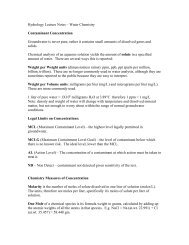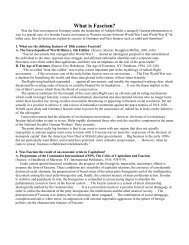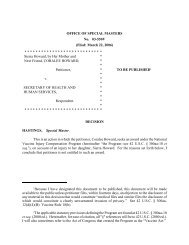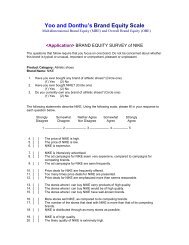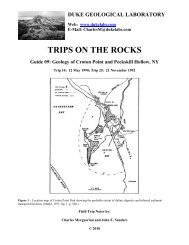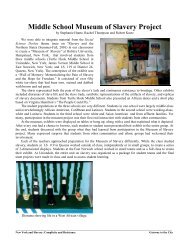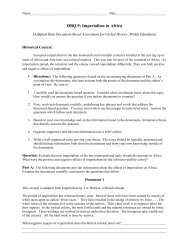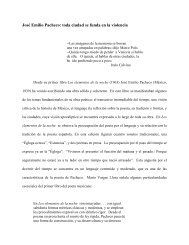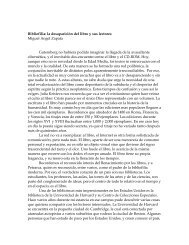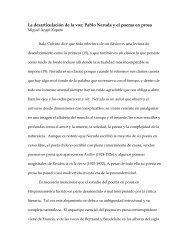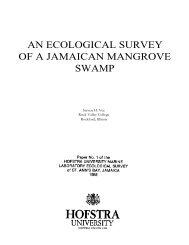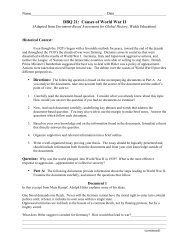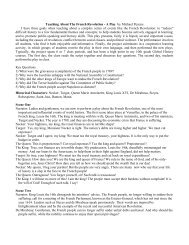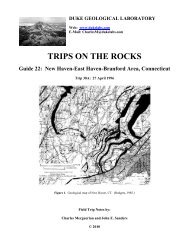The Significance of Dien Bien Phu (1954) - Hofstra People
The Significance of Dien Bien Phu (1954) - Hofstra People
The Significance of Dien Bien Phu (1954) - Hofstra People
Create successful ePaper yourself
Turn your PDF publications into a flip-book with our unique Google optimized e-Paper software.
<strong>The</strong> <strong>Significance</strong> <strong>of</strong> <strong>Dien</strong> <strong>Bien</strong> <strong>Phu</strong> (<strong>1954</strong>)<br />
by Brad Seidman and Charles De Jesus<br />
Indochina, including Vietnam, Cambodia and Laos, became a French colony in the<br />
1880s. Like other 19th century European powers looking to establish global empires,<br />
France used the spread <strong>of</strong> Christianity to insert themselves into Indochinese society.<br />
However, this was merely a pretext to establish political control and exploit Indochina’s<br />
natural resources, particularly rubber. France’s goals were summarized by Prime Minister<br />
Jules Ferry with the remark, “Colonial policy is the daughter <strong>of</strong> industrial policy.”<br />
French actions were continually met with resistance by the people <strong>of</strong> Indochina. In 1858,<br />
the Emperor Thieu Tri unsuccessfully sought to limit the activities <strong>of</strong> foreigners in Vietnam<br />
and between 1885 and 1916 the Vietnamese mounted a series <strong>of</strong> rebellions. At the<br />
Versailles Conference at the end <strong>of</strong> World War I, a Vietnamese delegation tried to petition<br />
for an end to French colonialism, but it was barred from participation.<br />
During the 1920s, a figure emerged who brought unity to the different factions fighting against the French.<br />
Nguyan Tat Than, also known as Ho Chi Minh, joined the French Communist Party in 1920 and secured the<br />
support <strong>of</strong> the newly established Soviet Union for his movement. Ho Chi Minh believed that “All subject peoples<br />
are filled with hope by the prospect that an era <strong>of</strong> right and justice is opening for them. . . in the struggle <strong>of</strong><br />
civilization against barbarism.” He declared, “If you force us into war, we will fight. <strong>The</strong> struggle will be atrocious,<br />
but the Vietnamese people will suffer anything rather than renounce their freedom.”<br />
<strong>The</strong> situation in Vietnam fundamentally changed with the onset <strong>of</strong> World War II. <strong>The</strong> defeat <strong>of</strong> France by<br />
Germany led to Japanese occupation <strong>of</strong> the former French colony. From 1940 until 1945, the Viet Minh (Front for<br />
the Independence <strong>of</strong> Vietnam), under the leadership <strong>of</strong> Ho Chi Minh, fought a guerrilla war against the Japanese. In<br />
July, 1945, Allied leaders decided to partition Vietnam, placing the south under British authority and the north<br />
under the Chinese. However in August, the Viet Minh captured Hanoi and proclaimed the Democratic Republic <strong>of</strong><br />
Vietnam. <strong>The</strong> Chinese withdrew, but the British turned control over the south to France, which wanted to<br />
reestablish its colonial empire. In 1946, the Viet Minh began their struggle against the French.<br />
Bao Dai, the nominal Emperor <strong>of</strong> Vietnam, abdicated and told the French, “You would understand better if you<br />
could see what is happening here, if you could feel this yearning for independence that is in everyone’s heart, and<br />
which no human force can any longer restrain. Should you re-establish a French administration here, it will not be<br />
obeyed. Every village will be a nest <strong>of</strong> resistance, each foreign collaborator an enemy.”<br />
With financial support from the United States, French forces tried to regain control over Vietnam until they<br />
were defeated by the Viet Minh at the Battle <strong>of</strong> <strong>Dien</strong> <strong>Bien</strong> <strong>Phu</strong> in April, <strong>1954</strong>. In that battle, there were 1,500<br />
French killed, 4,000 wounded and 10,000 sold-iers taken as prisoners. In July, <strong>1954</strong>, the Viet Minh and France<br />
signed an armistice and France agreed to withdraw all <strong>of</strong> her troops by July 1956.<br />
Global Impact <strong>of</strong> <strong>Dien</strong> <strong>Bien</strong> <strong>Phu</strong><br />
In 1962, Franz Fanon, a French trained psychiatrist who was working in Algeria in the middle <strong>of</strong> its<br />
independence struggle explained the importance <strong>of</strong> <strong>Dien</strong> <strong>Bien</strong> <strong>Phu</strong> to all third world revolutionary movements. In<br />
<strong>The</strong> Wretched <strong>of</strong> the Earth, Fanon wrote, “<strong>The</strong> great victory <strong>of</strong> the Vietnamese people at <strong>Dien</strong> <strong>Bien</strong> <strong>Phu</strong> is no<br />
longer, strictly speaking, a Vietnamese victory. Since July <strong>1954</strong>, the questions which colonized people have asked<br />
themselves has been, ‘What must be done to bring about another <strong>Dien</strong> <strong>Bien</strong> <strong>Phu</strong>? How can we manage?’. . This<br />
encompassing violence does not work upon the colonized people only; it modifies the attitude <strong>of</strong> the colonists who<br />
become aware <strong>of</strong> manifold <strong>Dien</strong> <strong>Bien</strong> <strong>Phu</strong>s.”<br />
A useful video for teaching about the French in Vietnam is the first episode <strong>of</strong> the PBS series, Vietnam: A<br />
Television History. It chronicles French colonialism and Vietnamese resistance. In the document-based assignment<br />
that follows, students examine the origins <strong>of</strong> French imperial policy, the struggle to overthow it, and the global<br />
consequences <strong>of</strong> the French defeat at <strong>Dien</strong> <strong>Bien</strong> <strong>Phu</strong>.
Document Packet: What were the global consequences <strong>of</strong> the French defeat at <strong>Dien</strong> <strong>Bien</strong> <strong>Phu</strong>?<br />
Introduction: This document-based essay is based on documents (1-10). It is designed to test your ability to work<br />
with historical documents. Some <strong>of</strong> the documents have been edited. As you analyze the documents, take into<br />
account both the source <strong>of</strong> each document and any point <strong>of</strong> view that may be presented in the document.<br />
Historical Context: Indochina, colonized by France in the 19th century, entered into a long struggle to achieve<br />
independence. <strong>The</strong> Indochinese were eventually victorious in <strong>1954</strong> after the battle <strong>of</strong> <strong>Dien</strong> <strong>Bien</strong> <strong>Phu</strong>.<br />
Task: Using information from the documents and your knowledge <strong>of</strong> global history, answer the questions that<br />
follow each document in Part A. Your answers to the questions will help you write the Part B essay, in which you<br />
will be asked to:<br />
Identify two (2) reasons why the French colonized Indochina.<br />
Describe the reactions <strong>of</strong> the people <strong>of</strong> Indochina to French rule.<br />
Explain how the French defeat at <strong>Dien</strong> <strong>Bien</strong> <strong>Phu</strong> affected their role on a global scale.<br />
In your opinion, did France’s defeat at <strong>Dien</strong> <strong>Bien</strong> <strong>Phu</strong> mark the end <strong>of</strong> an era? Explain.<br />
Note: Be sure to use specific evidence sited in the documents as well as outside knowledge about Global history.<br />
Part A<br />
1. Chronology <strong>of</strong> French Colonialism in Vietnam<br />
Source: http://www.entrenet.com/~groedmed/Vietnam/viethistoryindex.html<br />
1789 - 1792. Dynastic war in Vietnam. Prince Nguyen Anh accepts military assistance from the<br />
French.<br />
1801. Nguyen Anh triumphs and is proclaimed Emperor <strong>of</strong> Vietnam. <strong>The</strong> French became major<br />
figures in Vietnamese govemment, business, trade and military affairs.<br />
1847. French warships fire on and defeat Vietnamese warships.<br />
1858 - 1859. Emperor Thieu Tri, alarmed by European colonialism, limits the activities <strong>of</strong><br />
foreigners, including Catholic missionaries in Vietnam. <strong>The</strong> restrictions are used to justify a<br />
French invasion .<br />
1883. <strong>The</strong> Vietnamese Emperor signs a treaty effectively making Vietnam a French colony.<br />
1885 - 1916. Vietnamese patriots mount a series <strong>of</strong> unsuccessful rebellions.<br />
1919. A Vietnamese delegation is barred when it tries to present a petition for an end to French<br />
colonialism at the Versailles Conference.<br />
1920. Ho Chi Minh joins the French Communist Party and secures support from the Soviet<br />
Union.<br />
1932. Bao Dai becomes Emperor <strong>of</strong> Vietnam and seeks reform. He appoints Ngo Dinh Diem his<br />
prime minister.<br />
1933. Diem resigns and seeks political asylum in Japan.<br />
1939. Nationalist groups unite in Viet Minh (Front for the Independence <strong>of</strong> Vietnam), under the<br />
leadership <strong>of</strong> Ho Chi Minh.<br />
1940 - 1944. Vietnam is occupied by Japan. <strong>The</strong> Viet Minh fight a guerrilla war against the<br />
Japanese.<br />
1945. Allied leaders agree to a temporary partitioning <strong>of</strong> Vietnam. <strong>The</strong> south is placed under the<br />
British and the north under China. <strong>The</strong> Viet Minh capture Hanoi and proclaim the<br />
Democratic Republic <strong>of</strong> Vietnam. Bao Dai abdicates as emperor and the Chinese withdraw.<br />
British troops retum control <strong>of</strong> southern Vietnam to France.<br />
1946. <strong>The</strong> Viet Minh fight against French efforts to restore colonialism.<br />
1949. France <strong>of</strong>fers Vietnam limited independence and asks Bao Dai to form a government. <strong>The</strong><br />
Viet Minh refuse to recognize Bao Dai.
1950 - 1952. U.S. grants France aid to fight against the Viet Minh and sends a small military<br />
force to Saigon.<br />
1953. French concentrate troops at <strong>Dien</strong> <strong>Bien</strong> <strong>Phu</strong>.<br />
<strong>1954</strong>. Despite massive American financial assistance, the Viet Minh defeat the French at the<br />
Battle <strong>of</strong> <strong>Dien</strong> <strong>Bien</strong> <strong>Phu</strong>. Only 3,000 <strong>of</strong> a French force <strong>of</strong> 16,500 survive. In July, the Viet<br />
Minh and France sign an armistice. All combatants withdraw to either side <strong>of</strong> a line <strong>of</strong><br />
demarcation. All French troops are to leave Vietnam by July 1956, when elections are to be<br />
held to choose a national government.<br />
2. Justifications for French Colonialism<br />
Source: Karnow, S. (1983). Vietnam, p. 55, 97.<br />
Monsignor Pierre Joseph Georges Pigneau de Behaine<br />
(1787). “We must, with unquenchable ardor, propagate<br />
our sacred religion”<br />
Jules Ferry, French Prime Minister (c. 1883). “Colonial<br />
policy is the daughter <strong>of</strong> industrial policy.”<br />
Paul Doumer, French governor <strong>of</strong> Indochina (1902).<br />
“When France arrived in Indochina, the Annamites<br />
(Vietnamese) were ripe for servitude”.<br />
1. According to these quotations, why did the French<br />
colonize Indochina?<br />
3. A French picture postcard showing the severed<br />
heads <strong>of</strong> Vietnamese insurgents, circa 1880s.<br />
• What does this picture postcard say about French<br />
attitudes toward the Vietnamese?<br />
4. Ho Chi Minh. Ho Chi Minh was a Vietnamese citizen and a communist leader who<br />
played a major role in unifying the factions fighting against the French in the 1920s<br />
and 1930s. When the country was divided in 1956, he became President <strong>of</strong> the<br />
Democratic Republic <strong>of</strong> Vietnam in the northern section <strong>of</strong> the country. He died in<br />
1969, before the country was reunified (Source: Karnow, p. 135).<br />
“All subject peoples are filled with hope by the prospect that an era <strong>of</strong> right and justice<br />
is opening for them. . . in the struggle <strong>of</strong> civilization against barbarism. . . If you force<br />
us into war, we will fight. <strong>The</strong> struggle will be atrocious, but the Vietnamese people<br />
will suffer anything rather than renounce their freedom. . . You can kill ten <strong>of</strong> my men<br />
for every one I kill <strong>of</strong> yours. But even at these odds, you will lose and I will win.”<br />
1. What did Ho Chi Minh say to the French?<br />
2. Based on this quote, do you think Ho Chi Minh should be considered primarily a communist<br />
or a nationalist?<br />
3. In your opinion, if the struggle in war will be “atrocious,” is it worth the battle? Explain.<br />
5. Between 1940 and 1945, an occupying Japanese army controlled Vietnam. “Supplies for<br />
the United States Embassy and Chungking are among the shipments held up because <strong>of</strong> the<br />
French- Japanese agreement for a cessation <strong>of</strong> all shipments <strong>of</strong> militarily valuable goods from<br />
Indochina into Nationalist China, it was learned today. French <strong>of</strong>ficials said the American<br />
supplies, consigned to Ambassador Nelson T. Johnson, were held up “temporarily” pending<br />
regularization <strong>of</strong> the Japanese inspection system, which is designed to prevent passage <strong>of</strong> any<br />
supplies that might be <strong>of</strong> use to Chinese armies in their “war <strong>of</strong> resistance” against Japan.” -<strong>The</strong><br />
New York Times, July 25,1940<br />
1. According to this news item, what is happening in Vietnam?
2. In your opinion, should the Japanese be considered liberators or conquerors <strong>of</strong> Vietnam?<br />
Explain.<br />
5. Emperor Bao Dai. Bao Dai became Emperor <strong>of</strong> Vietnam in 1932, while it was a French<br />
colony. During World War II, he cooperated with both the Vichy French and the Japanese. At the<br />
end <strong>of</strong> the war, the Viet Minh nationalists under Ho Chi Minh forced his resignation. When he<br />
transferred his mandate to govern Vietnam to Ho Chi Minh, he issued a warning to France:<br />
“Should you re-establish a French administration here, it will not be obeyed. Every village will be<br />
a nest <strong>of</strong> resistance, each former collaborator an enemy.” (Karnow, p. 147)<br />
3. How does Bao Dai feel about the French efforts to re-establish a colony in Vietnam?<br />
6. An Historian Examines Efforts to Reestablish a French Colony in Vietnam after World<br />
War II.<br />
Source: Karnow, S. (1983) Vietnam.<br />
A. “On the morning <strong>of</strong> November 23 [1946], [a French Colonel named] Dèbes demanded that<br />
the Viet Minh authorities evacuate their troops . . . within two hours. <strong>The</strong> Vietnamese, protesting<br />
that they were observing the cease-fire, telephone Hanoi for instructions. Dèbes gave them an<br />
additional 45 minutes, then issued the order. French infantry and armored units went through the<br />
city, fighting house to house against Viet Minh squads. French aircraft zoomed in to bomb and<br />
strafe while the cruiser Suffren, in the harbor lobbed shells into the city, demolishing whole<br />
neighborhoods <strong>of</strong> flimsy structures” (p. 156).<br />
B. “[United States President] Truman did not actually sign the military aid legislation until July 26,<br />
1950. But on June 28, three days after the Korean War broke out, [Secretary <strong>of</strong> State] Acheson<br />
persuaded him to order an ‘acceleration’ <strong>of</strong> assistance to the French. A day after that, and four<br />
weeks before the military aid bill becomes law, eight C-47 cargo aircraft flew across the Pacific to<br />
Indochina - not the only time that the United States was to act illegally in Vietnam. During the next<br />
four year, the United States was to spend nearly $3 billion to finance the French in Indochina” (p.<br />
177).<br />
1. How did the French try to re-establish themselves in Vietnam after the defeat <strong>of</strong> the Japanese<br />
in World War II?<br />
2. How did the United States respond to the French’s efforts to re-colonize?<br />
3. In your opinion, why did the United States decide to support the French?<br />
7. <strong>The</strong> fall <strong>of</strong> <strong>Dien</strong> <strong>Bien</strong> <strong>Phu</strong>. <strong>Dien</strong> <strong>Bien</strong> <strong>Phu</strong> fell to the Viet Minh on May 7, <strong>1954</strong>.<br />
At least 2,200 members <strong>of</strong> the French forces died during the siege and thousands<br />
more taken prisoner. Of the 50,000 or so Vietnamese who besieged the garrison,<br />
there were about 23,000 casualties including an estimated 8,000 killed.<br />
“Vietminh insurgents wrested three strong points from the French today in their<br />
third major assault on besieged <strong>Dien</strong> <strong>Bien</strong> <strong>Phu</strong>. French positions were overrun in the<br />
eastern, northeastern and western sectors <strong>of</strong> the shrinking <strong>Dien</strong> <strong>Bien</strong> Phy redoubt. . .<br />
Fierce hand-to-hand fighting was reported in what might be the decisive battle for<br />
<strong>Dien</strong> <strong>Bien</strong> <strong>Phu</strong>. A French military spokesman said: “<strong>The</strong>re have been heavy losses Captured French troops.<br />
on our side and extremely heavy losses on the Viet Minh side.’” – <strong>The</strong> New York<br />
Times, May 3, <strong>1954</strong> p. 1.<br />
• In your opinion, why was the fighting at <strong>Dien</strong> <strong>Bien</strong> <strong>Phu</strong> so intense and the casualties so high?<br />
8. Reactions to the French Defeat at <strong>Dien</strong> <strong>Bien</strong> <strong>Phu</strong><br />
A. “<strong>Dien</strong> <strong>Bien</strong> <strong>Phu</strong>,” Editorial, <strong>The</strong> New York Times (May 6, <strong>1954</strong>). “A few months ago it was an<br />
unheard <strong>of</strong> point in a far-away valley in the jungles <strong>of</strong> Southeastern Asia. Today <strong>Dien</strong> <strong>Bien</strong> <strong>Phu</strong><br />
rings around the world as one <strong>of</strong> the epic battles <strong>of</strong> history. . . .For fifty-six days wave after wave<br />
<strong>of</strong> besiegers have been thrown, for political purposes and with a reckless disregard <strong>of</strong> human life,
against the isolated and outnumbered garrison. <strong>Dien</strong> <strong>Bien</strong> <strong>Phu</strong> may fall at last,. . but the defenders<br />
have exacted from the enemy so high a price that the end <strong>of</strong> the siege can never be called a defeat.<br />
. . . It was held long enough to renew the free world’s faith in the victory <strong>of</strong> the cause for which it<br />
stands.”<br />
B. “<strong>Dien</strong> <strong>Bien</strong> <strong>Phu</strong> Mourning Eclipses French World War Victory Fete,” <strong>The</strong> New York Times<br />
(May 9, <strong>1954</strong>).“<strong>The</strong> ninth anniversary <strong>of</strong> victory over Germany was observed here today by<br />
Frenchmen too struck by the defeat at <strong>Dien</strong> <strong>Bien</strong> <strong>Phu</strong> to feel any joy. ‘A veil has fallen over<br />
France’, Edouard Herriot, an 81-year old stateman said, his statement appeared to sum up the<br />
atmosphere, for never have there such solemn observances <strong>of</strong> an armistice that established Allied<br />
supremacy in World War II.”<br />
C. “After <strong>Dien</strong> <strong>Bien</strong> <strong>Phu</strong>, What?,” <strong>The</strong> New York Times (May 9, <strong>1954</strong>). “<strong>The</strong> fall <strong>of</strong> <strong>Dien</strong> <strong>Bien</strong><br />
<strong>Phu</strong> marks the end <strong>of</strong> an era. <strong>The</strong> ultimate military, political and psychological reactions may<br />
either make or break the anti-Communist front in the Far East and France as a great power. . . A<br />
lost battle has tipped the scales <strong>of</strong> history in the past; <strong>Dien</strong> <strong>Bien</strong> <strong>Phu</strong> may prove, in future<br />
accountings, to be the balance point <strong>of</strong> contemporary history.”<br />
D. “You are all aware that the French and their Vietnam ally have suffered reverses, notably the<br />
fall <strong>of</strong> <strong>Dien</strong> <strong>Bien</strong> <strong>Phu</strong> after a superb defense. <strong>The</strong> present situation is grave, but by no means<br />
hopeless. In the present conference at Geneva, we and other free nations are seeking a formula by<br />
which the fighting can be ended and the people <strong>of</strong> Indochina assured true independence. So far<br />
the Communist attitude at Geneva is not encouraging.” – Secretary <strong>of</strong> State John Foster Dulles,<br />
June, <strong>1954</strong>.<br />
E. “Reason and peace have won out. After days and nights <strong>of</strong> hard negotiations, filled with<br />
anxiety and hope, the cease-fire has been signed. In my soul and my conscience, I am sure these<br />
are the best conditions we could have hoped for in the present state <strong>of</strong> things.” Premier Pierre<br />
Mendes-France, July 21, <strong>1954</strong>.<br />
1. According to <strong>The</strong> New York Times, how did the French public respond to defeat at <strong>Dien</strong> <strong>Bien</strong><br />
<strong>Phu</strong>?<br />
2. Why does the New York Times believe that <strong>Dien</strong> <strong>Bien</strong> <strong>Phu</strong> marks the end <strong>of</strong> an era?<br />
3. How did the U.S. Secretary <strong>of</strong> State view the French defeat at <strong>Dien</strong> <strong>Bien</strong> <strong>Phu</strong>?<br />
4. What did the French government decide to do after <strong>Dien</strong> <strong>Bien</strong> <strong>Phu</strong>?<br />
9. Agreement on the Cessation <strong>of</strong> Hostilities in Viet-Nam, July 20, <strong>1954</strong><br />
<strong>The</strong> Geneva Agreements ended the war between France and the Viet Minh. Vietnam was<br />
temporarily divided until “free elections” could be held by July 20, 1956. Source:<br />
http://www.mtholyoke.edu/acad/intrel/genevacc.htm<br />
Article 1. A provisional military demarcation line shall be fixed, on either side <strong>of</strong> which the forces<br />
<strong>of</strong> the two parties shall be regrouped after their withdrawal, the forces <strong>of</strong> the <strong>People</strong>'s Army <strong>of</strong><br />
Viet-Nam to the north <strong>of</strong> the line and the forces <strong>of</strong> the French Union to the south.<br />
Article 16 (a). <strong>The</strong> withdrawals and transfers <strong>of</strong> the military forces equipment and supplies <strong>of</strong> the<br />
two parties shall be completed within three hundred (300) days.<br />
Article 34. An International Commission shall be set up for the control and supervision over the<br />
application <strong>of</strong> the provisions <strong>of</strong> the agreement on the cessation <strong>of</strong> hostilities in Viet-Nam. It shall<br />
be composed <strong>of</strong> representatives <strong>of</strong> the following States: Canada, India and Poland.<br />
• What were the results <strong>of</strong> the Geneva Accords?<br />
• In your opinion, which side had won the war? Explain.
10. Frantz Fanon, <strong>The</strong> Wretched <strong>of</strong> <strong>The</strong> Earth (1963). Fanon was a French trained psychiatrist<br />
from Martinique.<br />
“In spite <strong>of</strong> all that colonialism can do, its frontiers remain open to new ideas and echoes from<br />
the world outside. . . <strong>The</strong> great victory <strong>of</strong> the Vietnamese people at <strong>Dien</strong> <strong>Bien</strong> <strong>Phu</strong> is no longer,<br />
strictly speaking, a Vietnamese victory. Since July <strong>1954</strong>, the questions which colonized people<br />
have asked themselves has been, ‘What must be done to bring about another <strong>Dien</strong> <strong>Bien</strong> <strong>Phu</strong>?<br />
How can we manage?’. . . This encompassing violence does not work upon the colonized people<br />
only; it modifies the attitude <strong>of</strong> the colonists who become aware <strong>of</strong> manifold <strong>Dien</strong> <strong>Bien</strong> <strong>Phu</strong>s.<br />
This is why a veritable panic takes hold <strong>of</strong> the colonialist governments in turn” (p. 70).<br />
1. Does the author speak positively or negatively about colonialism? Explain.<br />
2. Why does the author feel that the <strong>Dien</strong> <strong>Bien</strong> <strong>Phu</strong> victory is not only a victory for the<br />
Vietnamese people?<br />
3. If you were a French colonial, how might you react after the defeat at <strong>Dien</strong> <strong>Bien</strong> <strong>Phu</strong>?<br />
Part B<br />
Identify two (2) reasons why the French colonized Indochina.<br />
Describe the reactions <strong>of</strong> the people <strong>of</strong> Indochina to French rule.<br />
Explain how the French defeat at <strong>Dien</strong> <strong>Bien</strong> <strong>Phu</strong> affected their role on a global scale.<br />
In your opinion, did France’s defeat at <strong>Dien</strong> <strong>Bien</strong> <strong>Phu</strong> mark the end <strong>of</strong> an era? Explain.



